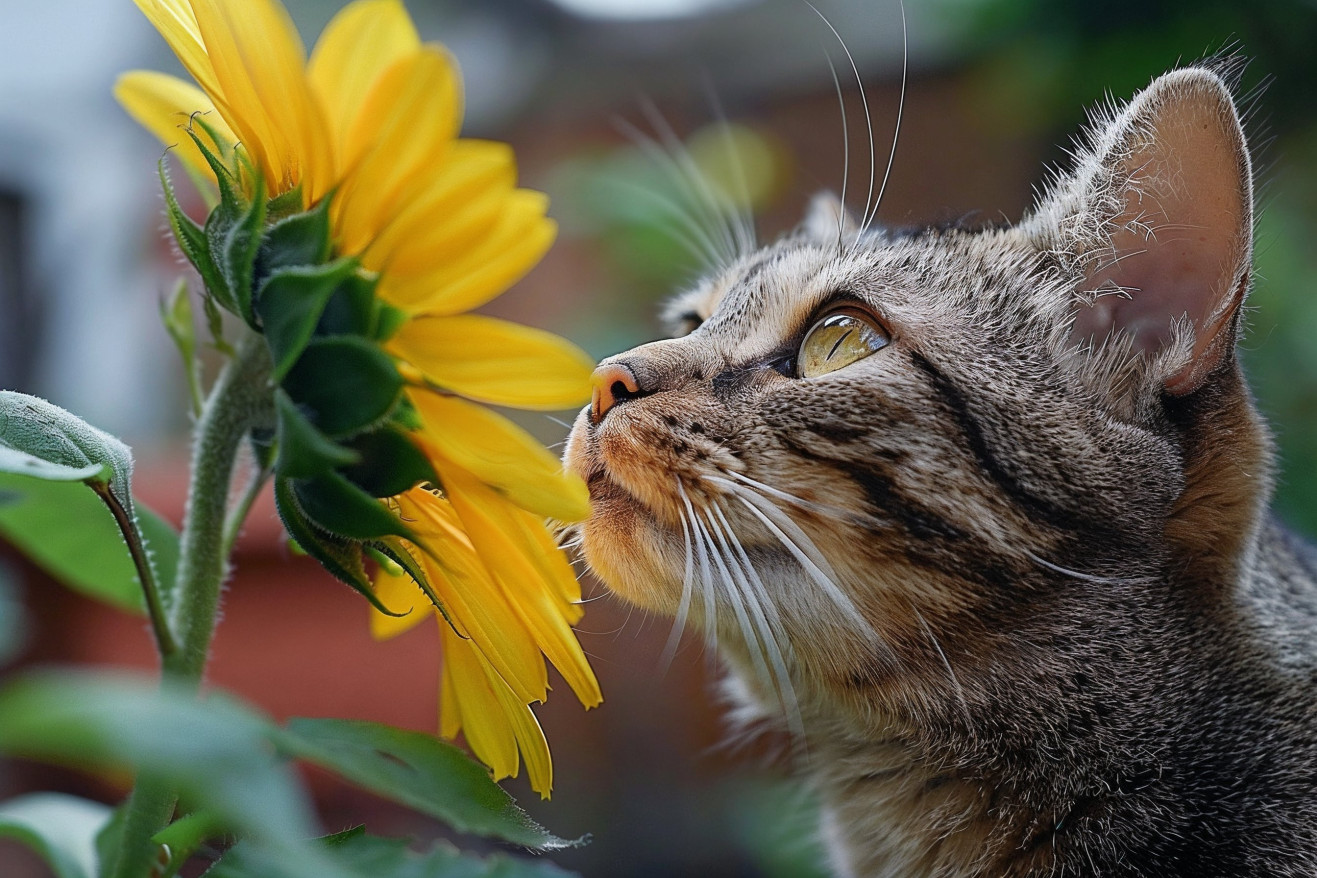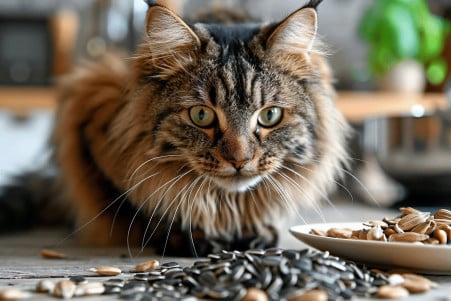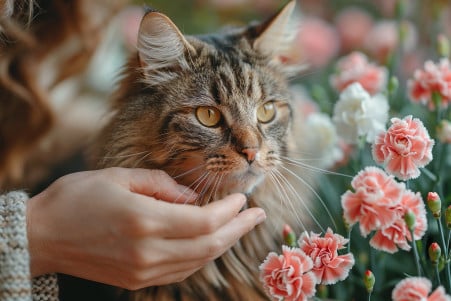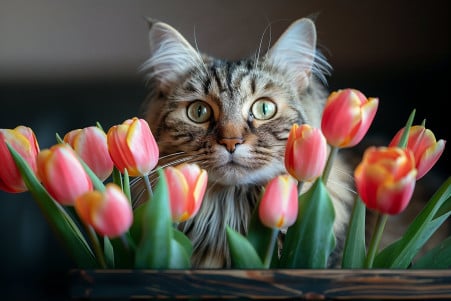Can Cats Eat Sunflowers? A Guide for Pet Parents
19 April 2024 • Updated 17 April 2024

Sunflowers are a bright, happy addition to any home, but can your cat enjoy them as well? While sunflowers are not poisonous to cats, their tough stems, leaves, and petals can be hard to digest and may lead to vomiting and diarrhea, so it's best to keep your cat from eating sunflowers.
By looking at information from veterinarians and other trusted sources, we'll go over the potential dangers and side effects of cats eating the different parts of the sunflower plant. This will help you know how to keep your cat safe and healthy around sunflowers, while still being able to enjoy their sunny presence inside and outside your home.
Are sunflowers poisonous to cats?
Risks of Cats Eating Sunflowers
Although sunflowers are considered non-toxic to cats by the ASPCA, there are still some risks associated with cats eating them. The thick stalks, leaves, and flower heads are hard for cats to digest and can cause vomiting, diarrhea, or other gastrointestinal issues if eaten in large amounts.
Sunflower seeds also pose risks - seeds that are still in the shell can cause choking or broken teeth if your cat tries to eat them. Even shelled sunflower seeds are dangerous for cats, as they are often flavored with salt or other seasonings, which can cause a loss of appetite, vomiting, diarrhea, and even neurological symptoms in cats according to the Pet Poison Helpline.
If your cat shows signs of distress, such as drooling, lethargy, pawing at the mouth, or swelling after coming into contact with sunflowers, it's important to get in touch with your vet right away so they can provide an accurate diagnosis and treatment. However, as long as you take some basic precautions, you can enjoy sunflowers in your home without worrying about your cat's safety.
How to Keep Cats Safe Around Sunflowers
In order to ensure that cats are safe around sunflowers, pet parents should closely monitor their cats and take steps to prevent them from coming into contact with the plants, especially if they are trying to eat them. Purina recommends planting sunflowers in heavy pots that can't be easily knocked over or moved to make them less accessible to cats.
Pet parents should also remove the flower heads from sunflowers and make sure that any sunflowers that are grown in the garden are not treated with chemical pesticides or fertilizers. The Creek Line House also recommends using natural deterrents like cayenne pepper, tin foil, or citrus peels to keep cats away from sunflowers and other plants. In addition, pet parents can provide cats with alternative enrichment, like cat grass or catnip, to keep them from eating sunflowers.
By taking these precautions, pet parents can enjoy sunflowers in their homes without worrying about their cats' safety. That said, pet parents should still watch their cats for signs of distress or illness after they've been exposed to sunflowers, as Greg.app explains that while sunflowers aren't toxic to cats, they can cause digestive upset if they are eaten in large amounts.
Sunflower Seeds: Risks and Safe Feeding Guidelines
Although sunflower seeds offer some nutritional benefits and can be a safe occasional snack for cats, including protein, vitamins, and healthy fats, there are some risks associated with feeding them to your pet. According to Preventive Vet, cats are more likely than dogs to choke and suffer from digestive issues when eating nuts and seeds because they are smaller and have more sensitive digestive systems.
Sunflower seeds’ hard shells can be a choking hazard and are hard for cats to digest, which can lead to gastrointestinal problems. Hepper explains that cats can’t open the shells like people and other animals can, so it’s important to remove the shells before giving your cat sunflower seeds.
In addition, sunflower seeds’ high fat content can lead to health problems like pancreatitis if cats eat too many. Catster suggests giving cats a few unsalted, unshelled sunflower kernels as an occasional treat and watching for signs of an allergic reaction or digestive issues.
It’s also important to choose sunflower seeds for your cat carefully because those that have been flavored or treated with preservatives or oils can be toxic. According to the ASPCA, the sunflower plant is not toxic, but pet owners should still be cautious and use moderation when feeding their cats sunflower-based snacks.
Sunflower Deterrents and Other Cat-Safe Plants
Even though sunflowers are safe for cats, some people may want to avoid them. Meadowlark Journal suggests using strong-smelling plants like lemon thyme as a natural deterrent to keep cats away from certain areas. Lemon thyme has a high essential oil content, which means it has a strong citrus scent that cats don't like and that can overwhelm their sensitive noses.
For those who want to avoid sunflowers and are looking for other plants that are safe for cats, Greg.app says that cat grass, catnip, and other non-toxic plants that are good for grazing and play are great options for enrichment. These plants will allow cats to do what comes naturally—nibble on plants—without the potential dangers of sunflowers.
If you can't live without sunflowers, Greg.app recommends planting them in areas that cats can't get to or using plant covers to keep cats from eating them. Regularly checking plants and addressing any issues that come up with them or your cat's interactions with them is also important. With these steps, cat owners can have sunflowers in their homes and gardens while keeping their cats safe and happy.
Conclusion: How to Safely Let Your Cat Near Sunflowers
While sunflowers are generally non-toxic and safe for cats, it's important to remember that moderation and supervision are important. Although the petals, leaves, stems, and seeds are not poisonous, the pollen can cause an allergic reaction in some cats. Meanwhile, overeating sunflowers can cause digestive upset, including vomiting and diarrhea, so it's important to limit access and provide alternative enrichment.
Sunflower seeds can be a healthy occasional treat for cats, as they are high in protein, vitamins, and healthy fats. However, the shells can be a choking hazard and the fat content can cause digestive upset if consumed in large quantities. As a result, cats should only be given the shelled sunflower kernels, and even then, they should be given in moderation as a special treat. In addition, store-bought sunflower seeds should be unsalted and unseasoned, and they should not be coated in oil, all of which can be toxic to cats.
If a cat shows any signs of distress after being exposed to sunflowers, including drooling, lethargy, or swelling, it's important to contact a veterinarian right away. However, with a few precautions, cat owners can enjoy sunflowers in their homes while keeping their pets safe.


